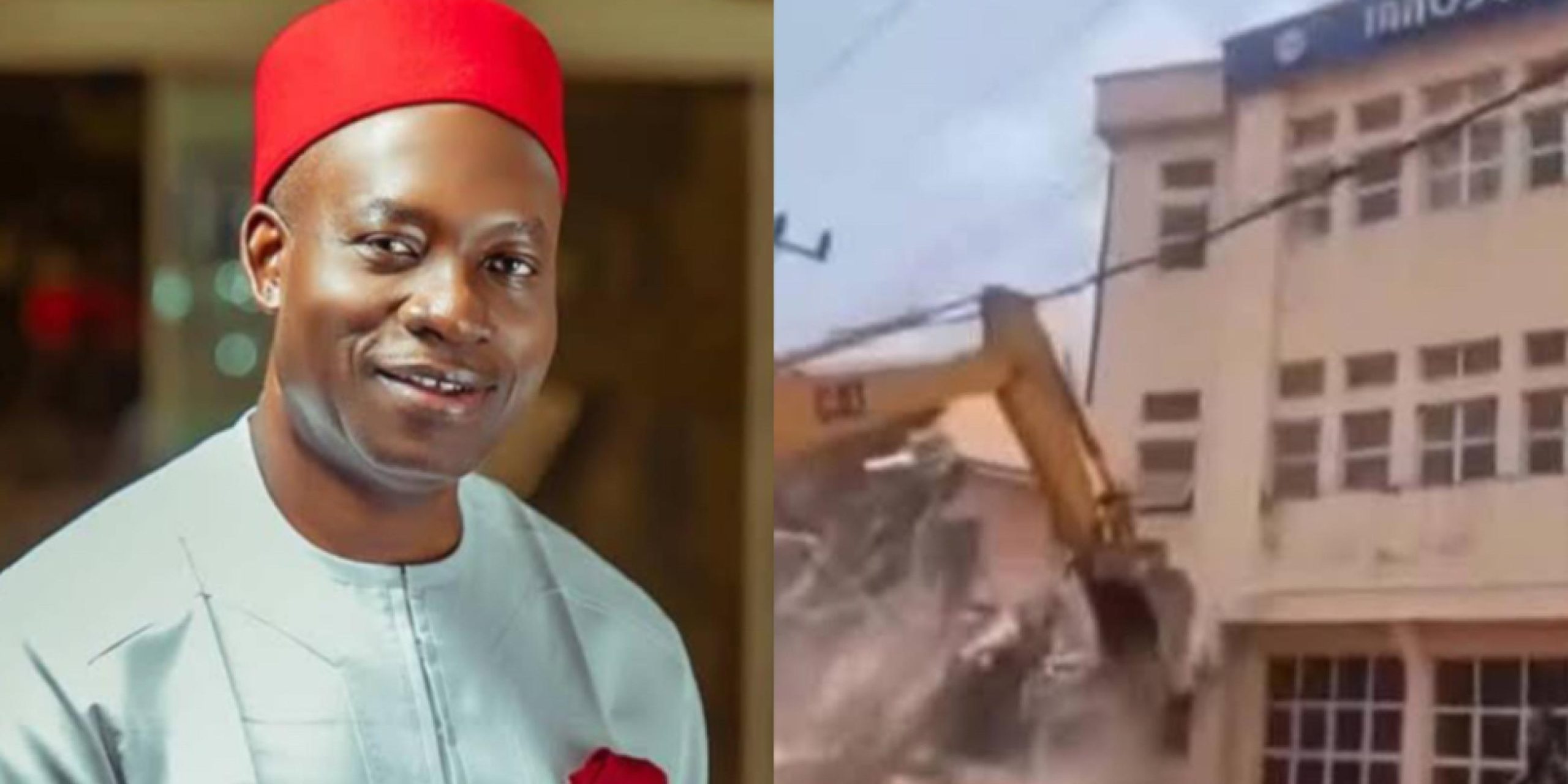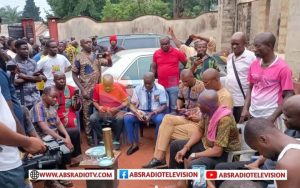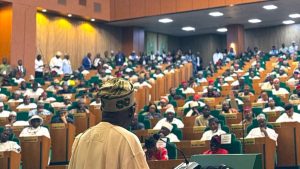Anambra Government Partially Demolishes Innoson Motors Head Office, Justifies Action
A dramatic twist unfolded in Anambra State on Wednesday, April 16, 2025, when bulldozers arrived unannounced and partially demolished the head office of Nigeria’s foremost indigenous automobile manufacturer, Innoson Vehicle Manufacturing (IVM), located in Umudim, Nnewi. The incident, which stunned staff and citizens alike, has triggered a public debate, raising critical questions about urban development, due process, and the possibility of politically motivated targeting of corporate entities.
The state government, led by Governor Charles Chukwuma Soludo, insists the action was part of a legitimate road expansion project aimed at improving access and easing perennial traffic gridlocks in the industrial town. But the leadership of Innoson Group is raising eyebrows at the selective manner in which the demolition exercise was carried out, alleging a lack of communication and unexplained deviation from marked demolition targets.
This is not merely a dispute over bricks and mortar — it’s a flashpoint that touches on governance, industrialization, and the delicate relationship between the state and one of its most iconic brands.
On the morning of April 16, workers at Innoson Motors’ head office went about their daily tasks as usual. The facility, a bustling center of innovation and administration, was hosting a full complement of employees. Then the unexpected happened: bulldozers and enforcement officials arrived and began tearing into the building’s perimeter and administrative structures.
YOU MAY READ
Anambra Governor Soludo’s Administration Faces Lawsuit Over Proposed Market Demolition
According to Cornel Osigwe, Head of Corporate Communications at Innoson Group, there was no prior notice. “The demolition came to us as a surprise,” he told reporters. “We did not know that the building itself was marked for demolition, and if it was, they should have given us time to relocate.”
The timing and execution of the demolition caused chaos. Several staff members were reportedly trapped inside before being evacuated. Over 20 vehicles, including some slated for dispatch to clients, were also trapped within the premises. Osigwe noted that although nearby buildings were marked for demolition, many were left untouched while the government’s demolition team made a beeline for Innoson’s property.
“This makes us wonder if there was an ulterior motive,” he stated.
Responding to public uproar, the Anambra State Commissioner for Works, Mr. Ifeanyi Okoma, offered the government’s justification. He stated that the demolition was part of a comprehensive road expansion initiative, not targeted at any specific individual or company.
“These buildings were marked sometime in December or January,” he said. “We are not looking at individuals; it is something that cuts across the whole place and it is not personalized. Even the Catholic Church and every other building along the road are affected. These roads were designed to decongest traffic gridlock experienced during festival periods.”
YOU MAY READ
Tension In Oba: Hotel Sealed After Five Kidnappers Arrested, Faces Demolition
Okoma emphasized that notices had been issued and markings were made visible. He dismissed insinuations of a political or personal vendetta.
“Governor Soludo is the only governor nationwide that uses made-in-Nigeria vehicles. Chief Innoson is our man; anybody trying to create wrong narratives about the demolition does not mean well.”
Founded by Chief Innocent Ifediaso Chukwuma, Innoson Motors is the pride of Nnewi and a symbol of Nigerian industrial resilience. Since its inception in 2007, the company has grown to become West Africa’s leading auto manufacturer, producing cars, buses, and trucks with significant local content.
Innoson’s operations are not just business — they are emblematic of indigenous technological progress. For many in Nnewi and beyond, an attack on Innoson is an attack on local industry and the vision of a self-reliant Nigeria.
The partial demolition of its headquarters, therefore, is not being taken lightly. Civil society groups, traditional rulers, youth associations, and concerned citizens have expressed dismay at what they describe as a “reckless and insensitive” act by the government.
“The issue is not whether a road project is good or bad,” said Chief Emma Ezeani, a community leader in Nnewi. “The problem is that you cannot destroy such an important national asset without due process. If you must touch Innoson, you must do so with transparency and respect.”
YOU MAY READ
Oba Hotel Demolition: Matter Arising Mr. Udoka, the Owner of Udoka Golden Point Hotel Oba, has reacted
At the heart of the controversy is the question of due process. Was Innoson adequately informed? Were alternative solutions explored? And why were other buildings marked for demolition spared?
Osigwe voiced frustration: “There were other buildings that were close to the head office and marked for demolition that were not demolished. But they came straight to our building and demolished it.”
The company’s leadership has expressed faith in Governor Soludo’s general stance toward local industry, stating that he has been a strong supporter of made-in-Nigeria vehicles. However, they fear that persons within the state’s civil service may have acted out of personal vendetta.
“The way and manner everything happened makes us wonder if the state government is aware that those handling the demolition have personal vendetta against the company,” Osigwe added.
The incident has reignited the perennial debate about how African governments balance industrial development with infrastructural expansion. In a country like Nigeria where industrial growth is nascent and fragile, critics argue that actions like this could scare off investors.
“You can’t claim to support local manufacturers and then turn around to demolish their headquarters,” said Dr. Ifeoma Ugochukwu, an economist. “Even if there was a legal basis, optics matter. The message to the world is that Nigerian businesses are not safe.”
YOU MAY READ
FCT Land Demolition Controversy: Rufai Oseni and Lere Olayinka Clash on Arise TV
The optics of bulldozers tearing through Innoson’s building while sparing others has, indeed, sparked a PR crisis for the state government.
While both parties have downplayed the possibility of political motives, some political analysts and opposition figures are not convinced. Nnewi, a politically vibrant city, has been the site of several contentious confrontations between industrialists and the political class.
“It would be naïve to think this is just about road expansion,” said a political commentator who requested anonymity. “There are layers to this. Innoson is powerful. He has connections. And where there is power, there is politics.”
Opposition figures in Anambra have seized on the incident to criticize the Soludo administration. Some allege that the action was a calculated move to “humble” Innoson, who is perceived by some politicians as wielding disproportionate influence.
“Whether true or not, the perception that Innoson is being targeted could become politically costly for the government,” the commentator added.
Legal experts have weighed in on the matter, emphasizing that even government projects must follow due process, including notice, consultation, and compensation.
Barrister Ngozi Akachukwu, a property lawyer based in Awka, noted: “Before any demolition, particularly one involving a corporate entity of this magnitude, the government is expected to issue a notice, allow time for response, and provide adequate compensation or relocation options.”
YOU MAY READ
Oba Hotel Demolition: Uncovering the Dark Truth – The hotel has well-partitioned graves of over 30 on the last floor with a shrine!!
Failure to adhere to this can result in lawsuits, reputational damage, and economic loss.
It remains unclear if Innoson Group plans to pursue legal action, but sources within the company say management is considering all options.
Nigerians have taken to social media to express their outrage. Hashtags such as #SaveInnoson, #SupportLocalIndustry, and #NnewiDemolition have trended for days.
“A government that demolishes Innoson’s head office is a government that does not understand industrial policy,” one user tweeted.
“Tomorrow they’ll tell us to support Nigerian-made goods. But they destroy our own manufacturers. What hypocrisy!” another commented.
The incident has even attracted the attention of diaspora communities and pan-African organizations, many of whom see Innoson as a beacon of African industrial self-determination.
In the aftermath of the demolition, stakeholders are calling for dialogue, accountability, and restitution.
The Anambra State Government must, if it hopes to retain credibility, clarify the sequence of events that led to the demolition and provide public documentation showing that IVM was adequately informed. It must also make efforts to rebuild trust with the Innoson Group, whose presence in Nnewi is a major economic driver.
Similarly, Innoson must press for answers in a professional and legal manner. While emotions are understandably high, the company’s reputation for resilience and corporate diplomacy may serve it well in navigating this crisis.
Beyond both parties, civil society and business groups must begin to demand stronger protection for indigenous companies in Nigeria. From the oil sector to tech and now to automobile manufacturing, too many local firms have suffered from government actions that appear high-handed or uncoordinated.
The partial demolition of Innoson Motors’ head office is more than a local government issue. It is a defining moment for Anambra State — a state that prides itself on being the home of commerce and industry.
Governor Soludo, a former Central Bank Governor and respected economist, has consistently emphasized the need to support local production. The current incident threatens to cast a shadow over that legacy unless swiftly and transparently addressed.
For Nnewi, this incident is a rude reminder of how easily progress can be threatened. For Nigeria, it’s another call to action — to build a system that truly values, protects, and empowers its own.
As the dust settles, one can only hope that reason, justice, and accountability will prevail — and that Innoson, a symbol of Nigerian resilience and ingenuity, will emerge stronger from this ordeal.





